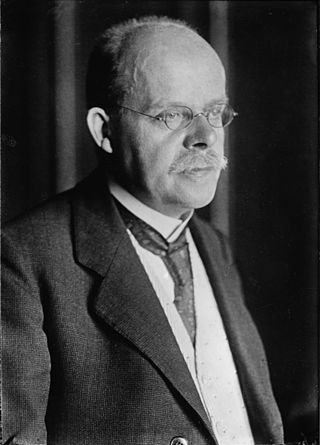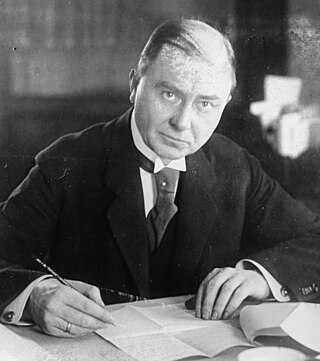Contents
| |||||
| Decades: | |||||
|---|---|---|---|---|---|
| See also: | Other events of 1923 History of Germany • Timeline • Years | ||||
Events in the year 1923 in Germany .
| |||||
| Decades: | |||||
|---|---|---|---|---|---|
| See also: | Other events of 1923 History of Germany • Timeline • Years | ||||
Events in the year 1923 in Germany .

Gustav Ernst Stresemann was a German statesman who served as chancellor of Germany from August to November 1923, and as foreign minister from 1923 to 1929. His most notable achievement was the reconciliation between Germany and France, for which he and French Prime Minister Aristide Briand received the Nobel Peace Prize in 1926. During a period of political instability and fragile, short-lived governments, Stresemann was the most influential politician in most of the Weimar Republic's existence.

The German People's Party was a conservative-liberal political party during the Weimar Republic that was the successor to the National Liberal Party of the German Empire. Along with the left-liberal German Democratic Party (DDP), it represented political liberalism in Germany between 1918 and 1933.

Wilhelm Marx was a German judge, politician and member of the Catholic Centre Party. During the Weimar Republic he was the chancellor of Germany twice, from 1923–1925 and 1926–1928, and served briefly as the minister president of Prussia in 1925. With a total of 3 years and 73 days, he was the longest-serving chancellor during the Weimar Republic.

The Dawes Plan temporarily resolved the issue of the reparations that Germany owed to the Allies of World War I. Enacted in 1924, it ended the crisis in European diplomacy that occurred after French and Belgian troops occupied the Ruhr in response to Germany's failure to meet its reparations obligations.
The Timeline of the Weimar Republic lists in chronological order the major events of the Weimar Republic, beginning with the final month of the German Empire and ending with the Nazi Enabling Act of 1933 that concentrated all power in the hands of Adolf Hitler. A second chronological section lists important cultural, scientific and commercial events during the Weimar era.

The Rentenmark was a currency issued on 15 November 1923 to stop the hyperinflation of 1922 and 1923 in Weimar Germany, after the previously used "paper" Mark had become almost worthless. It was subdivided into 100 Rentenpfennig and was replaced in 1924 by the Reichsmark.
The following lists events that happened during 1924 in the Weimar Republic.

The Occupation of the Ruhr was a period of military occupation of the Ruhr region of Germany by France and Belgium between 11 January 1923 and 25 August 1925.
The Black Reichswehr was the name for the extra-legal paramilitary formations promoted by the German Reichswehr army during the time of the Weimar Republic; it was raised despite restrictions imposed by the Versailles Treaty. The secret organisation was dissolved in 1923 upon the failed Küstrin Putsch.

Karl Jarres was a German lawyer and politician of the German People's Party during the Weimar Republic. From 1923 to 1924, he was the minister of the Interior and vice-chancellor of Germany. Jarres was also the long-serving mayor of Duisburg from 1914 to 1933. After the Nazis deposed him, he started a career in industry.
Johann Becker was a German lawyer and politician of the German People's Party. From January 1916 to November 1918 he served as finance minister of the Grand Duchy of Hesse. He was elected a member of the Weimar National Assembly in 1919. He continued to serve as a delegate in the Reichstag until 1930. In 1922/1923 he was Minister of Economics, under Chancellor Wilhelm Cuno, during the onset of hyperinflation.
Events in the year 1926 in Germany.
The Emminger Decree or Emminger Reform was an emergency decree in the democratic Weimar Republic by Justice Minister Erich Emminger (BVP) on 4 January 1924 that among other things abolished the jury as trier of fact and replaced it with a mixed system of judges and lay judges in Germany's judiciary which still exists today.

The Great Coalition was a grand coalition during the Weimar Republic that was made up of the four main pro-democratic parties in the Reichstag:
Events in the year 1902 in Germany.
Events in the year 1929 in Germany.

The Cuno cabinet, headed by Chancellor Wilhelm Cuno, a political independent, was the seventh democratically elected government of the Weimar Republic. It took office on 22 November 1922 when it replaced the second cabinet of Joseph Wirth, which had resigned after being unable to restructure its coalition following the loss of a key vote in the Reichstag.

The first Stresemann cabinet, headed by Gustav Stresemann of the German People's Party (DVP), was the eighth democratically elected government of the Weimar Republic. The cabinet took office on 13 August 1923 when it replaced the Cuno cabinet under Wilhelm Cuno, which had resigned following a call by the Social Democratic Party for a vote of no confidence which Cuno knew he could not win.

The second Stresemann cabinet, headed by Chancellor Gustav Stresemann of the German People's Party (DVP), was the ninth democratically elected government of the Weimar Republic. It took office on 6 October 1923 when it replaced the first Stresemann cabinet, which had resigned on 3 October over internal disagreements related to increasing working hours in vital industries above the eight-hour per day norm. The new cabinet was a majority coalition of four parties from the moderate left to centre-right.

The first Marx cabinet, headed by Wilhelm Marx of the Centre Party, was the tenth democratically elected government during the Weimar Republic. It took office on 30 November 1923 when it replaced the Second Stresemann cabinet, which had resigned on 23 November after the Social Democratic Party (SPD) withdrew from the coalition. Marx's new cabinet was a minority coalition of three centre to centre-right parties.